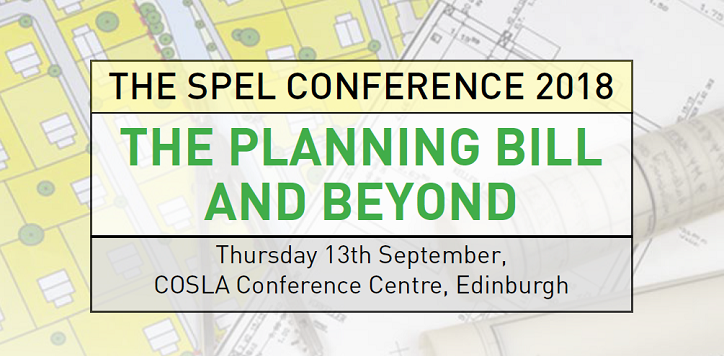
Last week, we welcomed delegates and speakers to the 2018 Scottish Planning and Environmental Law (SPEL) conference in Edinburgh, sponsored by Terra Firma Chambers.
Delegates and speakers came from organisations across Scotland to discuss and debate the current state and future opportunities for planning and environmental law in Scotland.
Should we just scrap planning altogether?
The conference was kicked off in typically thought provoking style by Greg Lloyd, Professor Emeritus at Ulster University, and visiting professor at Wageningen University in the Netherlands. Professor Lloyd delivered this year’s keynote and took the opportunity to challenge delegates and other speakers to consider what might happen if the current planning system were to be abolished altogether, to clear the way for a new and more fit-for-purpose planning system.
The creation of a new way of planning has, Professor Lloyd argued, the potential to better align community needs and other areas of policy like land and taxation, as well as creating opportunities for a more functional system, not as bogged down in process, where communities can come together to help make decisions about planning in their local area.
This “utopian vision of the future of planning” could potentially allow planning to ‘catch up’ with other services given that currently it is a 1950s model which has been shaped and adapted to allow us to “get by” rather than being reformed to suit new and changing planning needs. This new way, he argued, could be achieved if we are bold enough to take the leap away from the constraints and barriers presented by the “old” system.
Community empowerment and community right to buy: what are the implications for planning law?
Mark Lazarowicz and Pippa Robertson from Terra Firma Chambers and Aurora Planning respectively, navigated delegates through the complex waters of community right-to-buy, with Mark setting the scene and outlining some of the key elements to legislation and policy which have helped to shape community empowerment, including discussions around “relevant authorities”; “subjects of transfer”; and the “activation and implementation of community right-to-buy”. Pippa followed this with a discussion around community empowerment in relation to right-to-buy, and how this can be used to bring land back into active use.
The Planning Bill and funding infrastructure
Archie Rintoul, former chief valuer in Scotland, gave what many found to be a frank and insightful discussion of the issues around infrastructure development. Continuing on a similar theme after lunch, Russell Henderson from RPS explored the role of transport policy, and in particular sustainable transport. In both sessions there was further discussion of the importance of facilitating and accommodating new infrastructure, while recognising the growing responsibility to be aware of environmental factors, in part through the development of sustainable development measures for transport.
Following Russell, Laura Tainsh from Davidson Chalmers outlined the basis for, and the potential implications of, the Landfill Tax Ban, including an exploration of what the Bill may mean for those who work within the waste sector, and the potentially significant environmental impacts that the landfill ban may have when it is introduced in 2021.
The conference also included timely discussion of the progress of the Planning Bill and case law updates from Terra Firma, informing delegates of the latest developments in recent key cases.
Planning’s role in promoting inclusive economic growth
The conference was closed by RSA Scotland’s Lesley Martin who discussed how planning can help to promote inclusive economic growth. She questioned how the implementation and translation of the planning bill into practice will impact on inclusive growth in towns and cities.
Economic growth within places, she argued, can be driven through effective planning, and inclusive planning processes can in turn help to create inclusive economic growth. The planning bill is, she suggested, a symbol and an opportunity to provide an ambitious statement of the potential of wiser policy approaches. Planning is not merely about controlling or enabling development – it is an example of how the way we think and behave more generally impacts on inclusive growth in our towns and cities.
Summing up
This year’s SPEL conference sought to explore some of the wider implications of the Planning Bill for Scottish planning and the environment. By covering a range of topics the conference sought to highlight some of the key challenges and implications that the Bill may pose to the profession and to practice. The speakers were brought together to provide a range of perspectives and to help frame these issues for delegates and raise points for discussion and debate – and there was certainly plenty of that!
We would like to thank our speakers, those who attended and our sponsors, and hope to see you all next year!
We publish Scottish Planning and Environmental Law Journal every two months. More information on the journal and how to subscribe is available here.
We also blog regularly on planning and environmental issues … why not read one of our other recent articles:
- Making the planning system more customer-friendly
- Of kerbs, crossings and conceits: is this the end of the road for shared space?
- The kids are all right? Embedding children’s rights in town planning policy and practice
- Planning to protect: how architects and urban planners are balancing security with accessibility
- Planning for an ageing population: designing age-friendly environments
- Throwaway lines: poets celebrate the “hideous beauty” of landfill and the unsung heroes of waste management
- Accelerated development: do Simplified Planning Zones work?
Share
Related Posts
Tackling geographical inequalities is critical for ensuring that all parts of the country have the potential to prosper. When the UK was a member of the European Union, it was entitled to a share of funding from the EU’s structural ....
By Ian Babelon A new-old concept for proximity “Are we there yet?” Parents may patiently nod to their children’s insistent nudges on a 20-minute journey to… somewhere. Quite rightly, researchers have asked: twenty minutes to what? The answer may well ....
Following the adoption of National Planning Framework 4 (NPF4) at the end of February, the Scottish planning system and planning services are dealing with transitioning to a development plan system without statutory supplementary guidance and where the relationship to current ....


